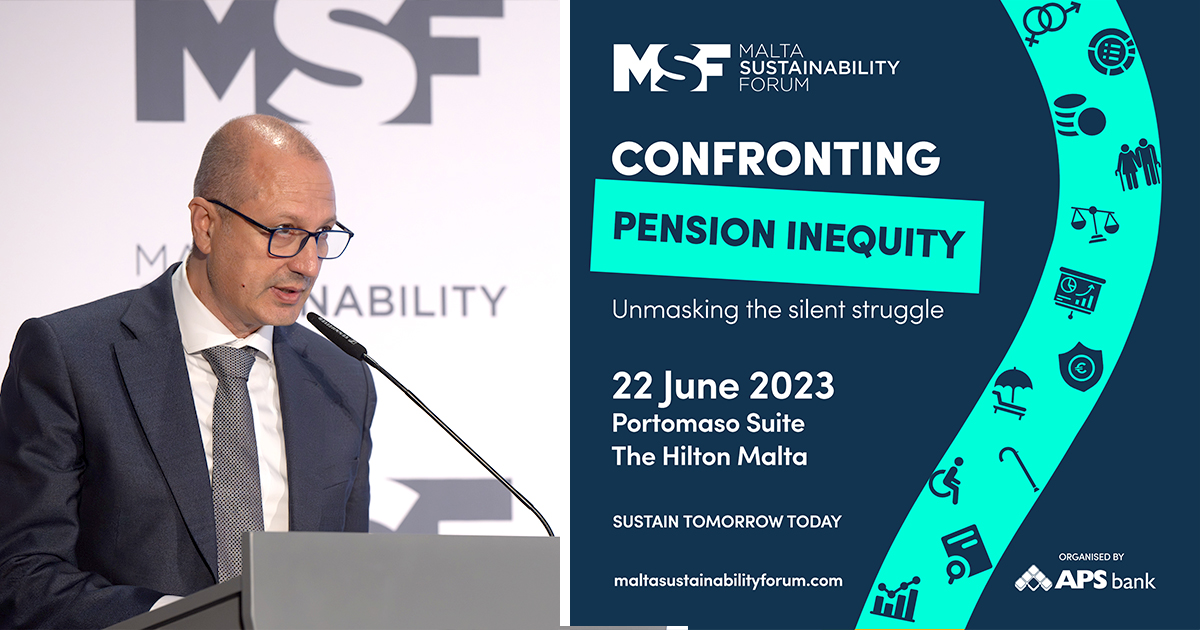There were some urgent ‘calls to action’ made at the Malta Sustainability Forum (MSF) on pension inequities organised by APS Bank plc, which focused on raising awareness about marginalised groups and creating a sustainable long-term lifestyle for pensioners.
Whether messages from some of the keynote speakers or from the members of the two panels, the lament was common: things could have been done many years ago which would have affected the lives of many.
Over the past years numerous changes to legislature, have been made from the comprehensive 2004 reform to subsequent Budget measures, which have helped literally tens of thousands. However, the fact is that what has been done has not been enough to ensure the adequacy of pensions for far too many people, not only now, but also in the future.
If we were to start with the 2004 reform, then one of the clear messages came from its main architect – David Spiteri Gingell – who lamented that one of the key factors in the reform’s success was education. For a start, the State pension going forward was not designed to be more than a safety net against poverty. It was always meant to be complemented by two other ‘pillars’: an occupational pension and a private pension.
The private pensions were put into a framework with tax credits to encourage take up. It has – largely – failed to gain momentum.
It is abundantly clear that most young people do not see putting money away for their old age as a priority – particularly when they are already facing other financial commitments, perhaps, to finance a new home and family, a career which is yet to reap financial rewards and so on. The evidence to support the massive gains from starting early simply do not hit home – which is where an ongoing, nationwide educational campaign would make a difference. During the conference, an example was given of the power of compound interest: someone who started paying into a pension pot at the age of 25 for only five years, accumulating €15,000, would have found €82,750 waiting for them at retirement age, assuming a net annual investment growth rate of 5%. That is already a good amount, but had that same person continued paying €3,000 a year, they could have had €350,750 – an amount which would contribute to achieve an adequate standard of living during the pension age.
That is one of the main points: the ‘two-thirds’ pension is a misnomer as the maximum you can draw down in 2023 is capped to some €17,000 – thus for those who earn more, no matter how much more, they will still only get the capped maximum. The impact of inflation – currently the annual rate is 6.3% – was also highlighted, and the picture gets even more alarming as high inflation affects pensioners more than it does other households.

The idea of the occupational pension is to transfer the behavioural burden onto an employer. There are many ways to do this: with the employee solely contributing, with the employer contributing, with both contributing; and – lastly – with a system that was either mandatory or voluntary. There are numerous tried and tested examples from various countries, all of which have advantages and disadvantages. During the MSF conference held in November 2022, a voluntary auto-enrolment system was put forward as the most appropriate solution for Malta. Employers would have the administrative obligation to enrol their employees into an occupational pension scheme but would not be compelled to contribute into it and the employees would have the chance to opt out. Not only was this the conclusions reached at the conference, but it was also one that was proposed jointly by the General Workers’ Union and the Malta Chamber of Commerce, Enterprise and Industry. Draft legislation was even presented to the Government by them.
During MSF last week, it was proposed that auto-enrolment would be introduced, with the possibility for other options in the future, such as making it mandatory or having employers contribute. But that does not have to be done now, and more importantly it does not need to be done through legislation. There is nothing to stop companies from doing this unilaterally through collective bargaining. This is a completely new experience for Malta – only 4% of companies surveyed by misco for the ‘APS Bank Pensions Engagement Survey’ offer occupational pension plans – and one that needs to be carefully nurtured until the system becomes a bit more mature.
The most important point? The only negative impact on the Government would be having to give out more tax credits – which would need to be balanced against having a whole cohort of people in the future having a comfortable life with more disposable income. Consider the alternative: there are already 33.3% of those aged 65 and over who are at risk of poverty and social exclusion (according to the recent NSO report) – which means 31,586 people. Most people adjust their spending to meet their income. That may sound draconian, but we are talking about forfeiting the cost of a coffee a day to invest in one’s private pension.
There were many other inequities discussed, from the plight of women, to the disabled, to those who cannot get refugee status. Specific changes to legislation were discussed at length by representatives from NGOs working with these groups. Too many people fall through the gaps, that we should be looking out for!
However, the main point was to get people to realise that the vast majority of them cannot rely on their State pension alone. They need to save throughout their lives, and the earlier they start, the better. This will also reduce the financial pressure on the State.
There is no time for short-term solutions: if ever there was the need to step in for the sake of the greater good, the time is now.
Noel McCarthy, Chief Investments Officer, APS Bank plc

